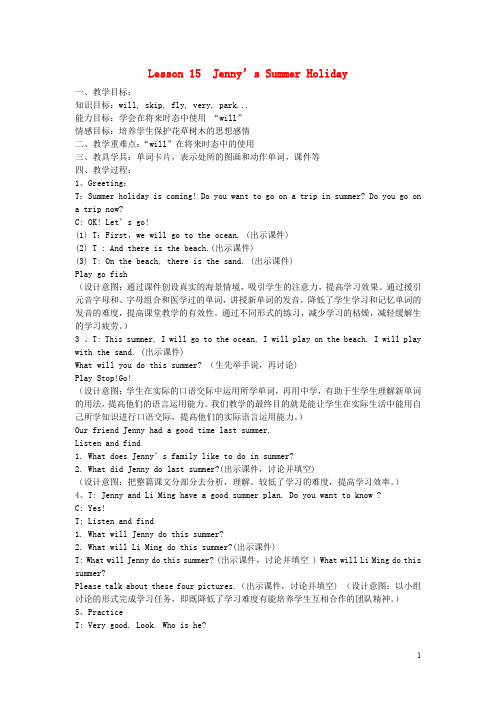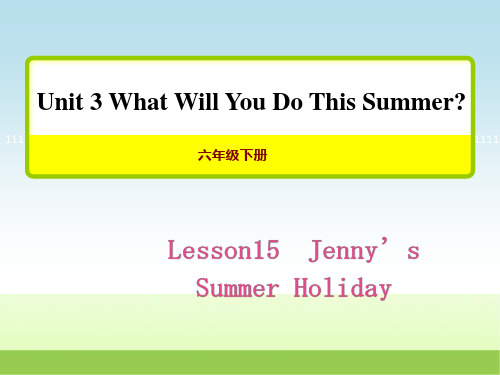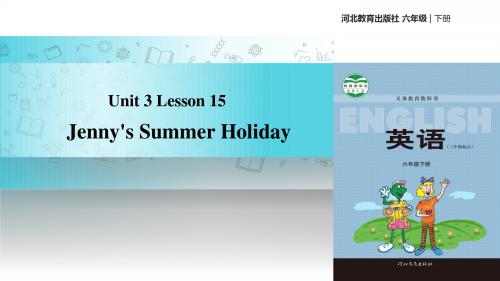冀教版小学英语六6年级下册6英JJ Unit 3 Lesson 15 Jenny’s Summer Holiday课后作业练习测试试卷
- 格式:doc
- 大小:73.50 KB
- 文档页数:4

Lesson 15 Jenny’s Summer Holiday一、教学目标:知识目标:will, skip, fly, very, park...能力目标:学会在将来时态中使用“will”情感目标:培养学生保护花草树木的思想感情二、教学重难点:“will”在将来时态中的使用三、教具学具:单词卡片,表示处所的图画和动作单词,课件等四、教学过程:1、Greeting:T:Summer holiday is coming! Do you want to go on a trip in summer? Do you go on a trip now?C: OK! Let’s go!(1) T:First,we will go to the ocean. (出示课件)(2) T : And there is the beach.(出示课件)(3) T: On the beach, there is the sand. (出示课件)Play go fish(设计意图:通过课件创设真实的海景情境,吸引学生的注意力,提高学习效果。
通过援引元音字母和、字母组合和医学过的单词,讲授新单词的发音,降低了学生学习和记忆单词的发音的难度,提高课堂教学的有效性。
通过不同形式的练习,减少学习的枯燥,减轻缓解生的学习疲劳。
)3 、T: This summer, I will go to the ocean, I will play on the beach. I will play with the sand. (出示课件)What will you do this summer? (生先举手说,再讨论)Play Stop!Go!(设计意图:学生在实际的口语交际中运用所学单词,再用中学,有助于生学生理解新单词的用法,提高他们的语言运用能力。
我们教学的最终目的就是能让学生在实际生活中能用自己所学知识进行口语交际,提高他们的实际语言运用能力。



教学设计一、教学目标1. 知识目标(1)能够听懂、会说、会读本课的生词和句子。
(2)能够运用所学语言进行简单的日常交流,如询问别人的假期计划等。
2. 能力目标(1)通过小组合作,培养学生的团队协作能力。
(2)提高学生的口语表达能力和听力理解能力。
3. 情感目标(1)培养学生热爱生活、积极向上的情感态度。
(2)培养学生与人分享、交流的习惯。
二、教学内容本课主要讲述Jenny的暑假假期计划,通过学习,学生能够掌握一般将来时的表达方式,如“I will go to”、“I will do”等。
同时,学生还能够学习到一些与假期相关的词汇,如“holiday”、“beach”、“mountain”等。
三、教学重点与难点重点:能够听懂、会说、会读本课的生词和句子,能够运用所学语言进行简单的日常交流。
难点:一般将来时的表达方式,以及与假期相关词汇的运用。
四、教具与学具准备教具:PPT、图片、卡片等。
学具:课本、练习本、文具等。
五、教学过程1. 导入(1)教师通过提问方式引导学生谈论自己的假期计划,激发学生的学习兴趣。
(2)展示Jenny的假期计划图片,引导学生猜测她将要去做什么。
2. 课堂展示(1)教师带领学生学习本课的生词和句子,通过PPT、图片、卡片等教具,帮助学生理解和记忆。
(2)学生跟读,教师纠正发音。
(3)学生分组进行角色扮演,运用所学语言进行交流。
3. 课堂练习(1)教师设计练习题,学生独立完成,检查对错。
(2)教师选取部分学生进行答案展示,并给予评价。
4. 小组合作(1)教师布置小组任务,要求学生相互询问假期计划,并进行记录。
(2)学生完成后,教师选取部分小组进行展示,并给予评价。
5. 课堂小结六、板书设计板书设计需突出本节课的主要内容,包括生词和句子。
七、作业设计1. 抄写本课生词和句子,每个生词和句子抄写两遍。
2. 运用所学语言,写一篇关于自己假期计划的短文。
八、课后反思本节课结束后,教师应认真反思教学效果,针对学生的掌握情况,调整教学策略,以提高教学效果。


教案:六年级下册英语教案Unit 3 Lesson 15 Jenny’sSummer Holiday一、教学目标1. 知识目标:(1)能够听懂、会说、会读本课的生词和重点句子。
(2)能够通过图片和情景理解课文大意,能够正确运用一般过去时描述过去发生的事情。
(3)了解Jenny的暑假活动,能够描述自己的暑假生活。
2. 能力目标:(1)能够正确运用一般过去时进行交流。
(2)能够运用所学知识进行简单的写作和口头报告。
3. 情感目标:培养学生热爱生活,积极乐观的人生态度。
二、教学内容本课主要讲述了Jenny的暑假活动,包括她去海边、参观农场和参加野餐的经历。
通过本课的学习,学生能够掌握一般过去时的用法,能够描述过去发生的事情。
三、教学重点与难点1. 重点:(1)一般过去时的用法。
(2)本课的生词和重点句子。
2. 难点:一般过去时的运用和句子结构的转换。
四、教具与学具准备1. 教具:PPT、图片、课文插图、黑板等。
2. 学具:课本、练习册、文具等。
五、教学过程1. 导入:通过询问学生“你的暑假是怎么度过的?”引导学生谈论自己的暑假生活,引出本课主题。
2. 展示:展示Jenny的暑假活动的图片,引导学生看图说话,引导学生说出“Jenny went to the beach/farm/picnic.”等句子。
3. 教学:(1)教授生词和短语:beach, farm, picnic, visited, saw, had, delicious, summer holiday等。
(2)教授句子:How was your summer holiday? I had a great time. I visited my grandparents on the farm. We went to the beach and had a picnic. The food was delicious.4. 练习:通过小组活动,让学生互相询问暑假生活,并用一般过去时进行回答。
冀教版六年级下册英语-Unit 3 Lesson 15 Jenny’s SummerHolidayTextPart 1Hello, I’m Jenny. I’m very happy to tell you about my summer holiday. In the summer holiday, I went to the countryside with my parents. The grass was green and the sky was blue. There were flowers and trees everywhere. It was very beautiful.Part 2We lived in a farm house. We had a lot of fun there. We went fishing in the river. We caught a lot of fish. We also picked apples and pears from the orchard. They were very sweet and juicy.Part 3We visited many places of interest around the farm. We went to a mountain and saw a waterfall. It was very high and it made a lot of noise. We also went to a lake and swam in it. The water was very clean and cool.Part 4We had a barbecue in the evening. My parents made delicious food and we ate a lot. After the barbecue, we sat around the campfire and sang songs. It was a lot of fun.Part 5The summer holiday was over too soon. I had to go back to school. But I will never forget the wonderful time I had in the countryside. I hope I can go there again next year.Vocabulary•countryside: 农村•grass: 草•blue: 蓝色的•flower: 花•tree: 树•farmhouse: 农舍•fishing: 钓鱼•river: 河流•apple: 苹果•pear: 梨•orchard: 果园•mountain: 山•waterfall: 瀑布•lake: 湖泊•swim: 游泳•barbecue: 烧烤•campfire: 篝火GrammarPast Simple TenseIn the text, Jenny is telling a story about her summer holiday. She uses the past simple tense to talk about things that happened in the past. For example, she says:•In the summer holiday, I went to the countryside. (go)•We caught a lot of fish. (catch)•We also went to a lake and swam in it. (swim)The past simple tense is used to talk about actions or events that happened in the past and are now finished. It is formed by adding -ed to the base form of regular verbs. For irregular verbs, the past simple tense form is different. Some examples of irregular verbs are:•go - went•catch - caught•swim - swam•make - made•sing - sangAdjectivesJenny uses adjectives to describe the things she saw and did during her summer holiday. For example:•The grass was green and the sky was blue. (green, blue)•We also picked apples and pears from the orchard. They were very sweet and juicy. (sweet, juicy)•We went to a mountain and saw a waterfall. It was very high and it made a lot of noise. (high, noisy)Adjectives are words that describe or modify nouns or pronouns. They give more information about the noun or pronoun they are describing. Adjectives can come before or after the noun they are describing. Some examples of adjectives are:•green•blue•sweet•juicy•high•noisyConclusionJenny had a wonderful summer holiday in the countryside. She did a lot of fun things with her parents and saw many beautiful sights. She used the past simple tense to talk about the things she did and adjectives to describe the things she saw.。
Lesson 15 Jenny’s Summer Holiday
一、谁与我同类。
() 1. swam A. watch B. pick C. played
() 2. ship A. train B. flowers C. beach
() 3. grandmother A. lake B. aunt C. boat
() 4. playing A. went B. coming C. go
() 5. lake A. sea B. angry C. will
二、替换或去掉一个字母,使其变为新单词并组成短语。
例:watch catch catch the ball
1. cake________ ________________
2. coat________ ________________
3. teach________ ________________
4. shop________ ________________
5. pea________ ________________
三、从括号中选择适当的内容补全句子。
1. My sister ________ (will watch/watches) the basketball game at the gym tomorrow.
2. ________ (Last Sunday/This Sunday), I went to the park.
3. I ________ (helped/will help) my mother clean the rooms next Saturday.
4. ________ (Who/When) went shopping with you?
5. ________ (Where/What) will his cousin go this summer holiday?
四、夏天就要到了,看看他们都将要做什么,并找出与之对应的图片。
A. They will play on the beach.
B. We will go on trips this summer.
C. She will sit in the sun.
D. My brother will eat the ice cream.
E. My sister will swim in the sea.
() () () () () 五、我会选。
() 1. Her family ________ to go on trips every summer.
A. liked
B. likes
C. liking
() 2. They will go on a trip ________ Dalian.
A. with
B. to
C. for
() 3. Sam ________ in the sea last summer.
A. swims
B. swim
C. swam
() 4. She will watch the ships ________ the sea.
A. of
B. on
C. out
() 5. He likes ________ to music.
A. listen
B. listening
C. listens
六、快来补全对话。
A: What’s your favourite season?
B: 1. ________
A: Why?
A: Where will you go this summer?
B: 3. ________. Can you swim?
A: No, I can’t.
B: It’s fun. Do you want to learn?
A: 4. ________
B: OK. 5. ________
七、阅读短文,回答问题。
(建议用时:5分钟)
Rose’s summer holiday is coming soon. Her family loves to go on trips in summer. Last summer, she went to a lake with her parents. She swam in the lake and played on the beach.
This summer she will go on a trip to the sea with her grandfather and grandmother. She will swim in the sea. She will watch the ships on the sea. She will be happy for the summer holiday.
1. What does Rose’s family love to do in summer?
_____________________________________________________________________ 2. Where did Rose go last summer?
_____________________________________________________________________
3. Who did Rose go to the lake with?
_____________________________________________________________________
4. What will Rose do this summer?
_____________________________________________________________________ 5. What will Rose watch on the sea?
_____________________________________________________________________ 八、快来接受Jack的采访吧!
1. What did you do last summer?
____________________________________
2. What will you do this summer?
____________________________________
答案:
一、1. C 2. A 3. B 4. B 5. A
二、1. lake in the lake 2. boat by boat
3. beach play on the beach
4. ship watch the ship
5. sea the big sea
(答案不唯一)
三、1. will watch 2. Last Sunday
3. will help
4. Who
5. Where
四、A E B C D
五、1. B点拨:主语Her family是第三人称单数,故谓语动词用单三形式。
2. B
3. C
4. B
5. B点拨:like doing sth. 喜欢做某事。
六、1. C 2. A 3. E 4. D 5. B
七、1. Her family loves to go on trips in summer.
2. She went to a lake last summer.
3. She went with her parents.
4. She will go on a trip to the sea.
5. She will watch the ships on the sea.
八、1. I swam last summer.
2. I will go on a trip to Yunnan this summer.
(答案不唯一)。